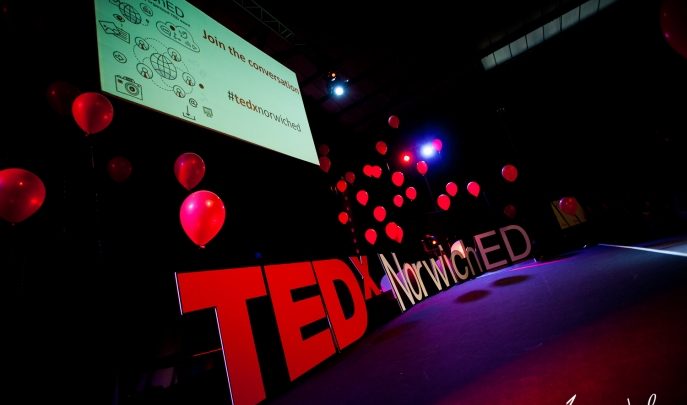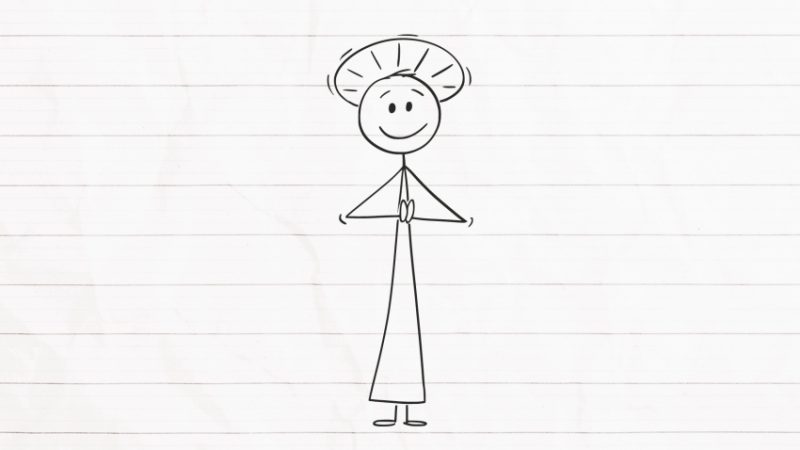‘Schools Are Becoming Like Sweatshops’ – And 15 Other Talking Points From TEDx NorwichEd

From tabloid war stories to banning teachers, our highlights from a day spent 'Thinking differently'…

An auditorium packed with attendees, 25 talks and many, many words of typed-out notes – Teachwire’s visit to the first education-themed TEDx event to be held in the UK for four years was nothing if not stimulating. Here, in no particular order, are our highlights…
1. Teachers are united by pens (and Teachwire needs to work on its vowels)
Teacher Rachel Jones (‘Unleash Your Inner Teacher Geek’) began her talk with a simple question – what brings teachers together? Knowledge and the acquisition of knowledge, yes – but also a stationary fetish. Wait, hang on…
@teachwire *stationery?
— Wendy Errington (@Erriwend) March 19, 2016
*Raps self on knuckles*
2. Twitter is increasingly like a boxing match, but doesn’t have to be.
Jones went on to observe that, ‘There’s more that unites us than divides us a profession, but you wouldn’t know it from looking online.’ Her talk concluded by calling on teachers to remember that they’re members of a caring profession, and to do more to celebrate positivity both in the classroom and elsewhere.
3. We need to ban ‘teachers’ and reinstate ‘educators’
One of the day’s more provocative talks was delivered by former teacher turned RSA Project Engagement Manager, Tom Gilliford. Having been among that 40% of teachers who quit the profession in their first five years, he recalled that it wasn’t the difficult children or hard budgets that drove him away.
It was ‘The reading from a script,’ prompted by the requirement for teachers to concentrate on teaching model answers to exam questions. Gilliford’s challenge – they might be ‘teachers’, but they’re not ‘educators’.
4. Schools are becoming like sweatshops
Gilliford further noted that just as we put difficult thoughts of sweatshops to back of our minds when purchasing cheap clothes, we appreciate seeing children achieve good grades without questioning how those grades were attained – and without considering the long-term costs that come from having children taught by ‘robot teachers’.
The comparative lack of teaching around empathy, and the creative thinking needed to tackle huge long-term issues, such as climate change or inequality, being just the start…
5. Car boot sales can be good place to pick up cheap teaching resources
In a talk entitled ‘Learning without limits’, Alison Peacock regaled the audience with the story of how, early on in her headship at The Wroxham School, she would scour car boot sales for teaching resources. One notable find was a box packed with Victorian-era bottles purchased for £5, which went on to be cleaned with soapy water and toothbrushes by a Y2 class learning about the Victorians.
This open-ended approach to learning caused palpable excitement among the children – who were nonetheless sensible enough to not try opening the sealed bottle with something still inside and attempt to drink its contents…
Read our Q&A with Alison Peacock here
6. Early years is all about bodily fluids
During an ebulliently scatological introduction to his talk (‘Subversive Teaching – Educators Under Cover’), Alistair Bryce-Clegg reminded the audience that much early years teaching is ‘Centred around wee and poo.’
His vivid descriptions of assisting children in toilets, sharing head lice concerns with spouses while in bed and sharing with your family the fact that you’re taking medication for threadworms elicited a fair few chuckles of recognition…
7. Children’s learning is abstract
Bryce-Clegg’s central point was that without a back catalogue of experience to relate things to, the leaps in logic and association demonstrated by 3 to 5-year-olds can come across as ‘A bit mad.’ Crucially, none of us are born as reluctant learners – children only become so when, for instance, boys are pounced on with a worksheet upon entering, say, ‘The writing area’ and learn to avoid doing so in future.
What’s needed, he argued, was learning that’s about their interests, and a sprinkling of magic. By dressing up what we want children to do in a learning environment – widening your eyes, setting ‘special assignments’ in a conspiratorial whisper – we can stop being ‘deliverers’ and start being ‘teachers’.
8. Allowing your school to be featured on TV is beneficial – but something you only need to do once
Vic Goddard’s address (‘What being on TV teaches you about your school’) took the form of a robust rebuttal to Sir Michael Wilshaw’s disapproval of schools being featured in reality TV shows.
While showing several clips from Educating Essex, Goddard (below) argued that on the contrary, the programme showed staff telling students how much they loved teaching them, and the importance of community and comradeship. Anyone thinking of becoming a teacher would not be put off by what they saw in Education Essex and similar programmes,
Goddard concluded that if things are looking bad in terms of teacher recruitment and general gloom within the profession, Wilshaw might be better off considering whether he might be in part responsible for that, rather than blaming a TV programme.
For all that, however, he conceded that ‘Having done it once, we’re done. But I’m grateful for the platform I now have to bang on about teaching…‘

9. TV exposure results in surprising opportunities and scrutiny
In between the revelations that then deputy head Mr Drew had appeared in Grazia magazine’s ‘Chart of Lust’, and that Passmores Academy pupils had been offered Calvin Klein modelling contracts after appearing on the show, Goddard spoke of his beef with The Sun, recalling that the paper had, ‘Called me childish. They were almost right – I’ll take ‘childlike’.’
10. Education needs to be disrupted, lest it experience a ‘Kodak moment’
How to ‘Educate a Generation that Knows Everything’ courtesy of Google was the topic tackled by KakeCo founder Kieran Miles. The answer? Disrupt education and embrace the potential of what technology offers.
Miles spoke of having to equip young people with knowledge for a world that doesn’t exist yet, but will do soon; in one eyebrow-raising example, Miles asked the audience to imagine how we might one day need to rethink sex-ed for a generation that may lose their virginity to a robot.

In the here and now, at least, he called for teaching to change ‘from a relevance perspective’. We know young people are engaged with social media, but have we really looked at why that is? Young people are engaged with ideas, he concluded. What we should be doing is asking them apply those ideas in interesting ways – perhaps even through hacking the school’s website…
10. Despite what the government might tell you, your kids are not cybercriminals
Like Vic Goddard, a large portion of web developer Mark Stevenson’s talk (‘Developing Developing Developers) saw him take issue with someone else’s implied criticisms. Namely this public information film by the National Crime Agency:
Against the backdrop of a major skills shortage in web development, Stevenson said, if parents see coding as something their child enjoys doing and has an aptitude for, it should be encouraged. That’s what his own mother – herself a teacher – had done with him, rather than assume he was a cybercriminal.
11. We shouldn’t be afraid of failure
This credo became something of a recurring theme throughout the day, highlighted in talks by Camouflaged Learning‘s Matt Bagley, Executive Pastor at Proclaimers Church, Owen Morgan and Mark Stevenson. It was addressed at length by Phillip Montague, a senior market development manager at Microsoft – ‘Can teachers fail to fix education?’
In a talk that touched that touched a childhood accident in which he almost drowned and examples of professional failures drawn from his own career experience, Montague arrived at a key message for those ‘Creative, driven and daring people’ in the room: ‘Failure is the single biggest contributor to your future success.’
12. ‘We ought to pay teachers £60k p/a’
It took a while for professional trader Siam Kidd to mention this within his mini lecture (full title – ‘How to pay teachers 60k a year, revolutionise UK schooling system and let kids know they can do anything in life’). The body of his talk was effectively a pitch for a new network of free schools that he plans to create, which will be informed by the theories of Sir Ken Robinson and operate according to 13 distinct principles.
Among them – ‘gamifying’ the syllabus by adopting students leader boards of learning; providing financial education regarding mortgages, interest rates and other practical areas; teaching Mandarin and martial arts; grouping learners into ability groups, rather than year groups; and making teaching a high status profession by upping teachers’ pay levels and according the profession greater prestige.
13. ‘We’re prepared to put ourselves under stress when there’s no one making us feel like a muppet’
A quote from Mary Myatt’s presentation, titled ‘High challenge, low threat – How top leaders find the balance’. Her proposition was that not only can testing be good, many of us actually enjoy testing ourselves in various ways, just so long as the circumstances are right.
Wise leaders will take it upon themselves to foster a ‘High challenge, low threat’ space, in which the process of testing results in learning; not dumbing down, but being ambitious in what kids learn – political concepts, the etymology of words – without the threat of high stakes and without making people feel like ‘muppets’…
14. Schools need to embrace the different and the unreasonable
Self-described ‘barefoot entrepreneur’ Robert Ashton made the case for why ‘Why we need to encourage children to be unreasonable’, beginning with the assertion that schools focus on making kids the same – and that Norfolk’s schools in particular are good at excluding kids who are different, if the county’s oversubscribed special schools are any indication.
He went on to highlight the way in which particularly bright individuals often don’t do well at school – and suggested that perhaps we should be putting more emphasis on measuring what kids want to do than on exam results…
15. Banish fear in the classroom and you’ll reap results
Annette Du Bois, in a talk on ‘Mindfulness and confidence in the classroom’ suggested as school children take on more stresses and pressures, they spend less time living in the moment. As a result, they’re left with a fear of being judged by their peers and reticent in class.
Instead, Du Bois, suggested, by building up pupils’ resilience and helping them ‘Shake It Off‘, you can have a class that’s present, engaged and not fearful of expressing opinions. She ended her piece by telling the audience that, “Young people by nature are mindful – it’s society that makes them fearful,’ and moreover that, ‘Mindfulness is not about ‘not thinking’ – it’s about thinking differently.’











